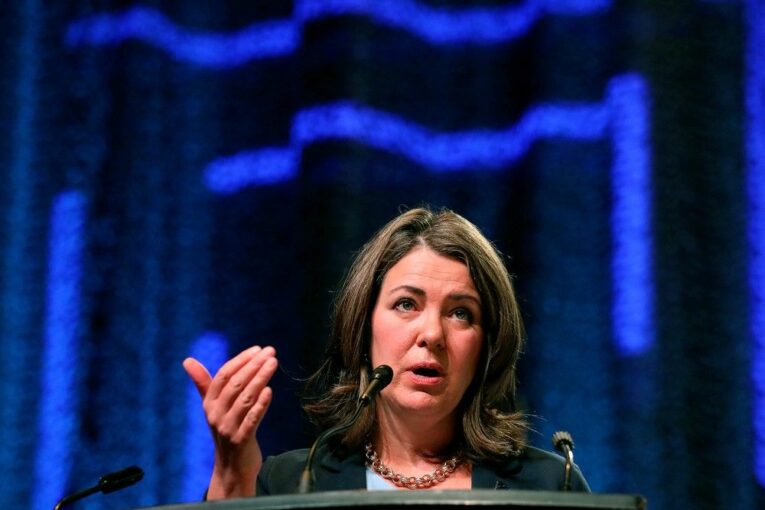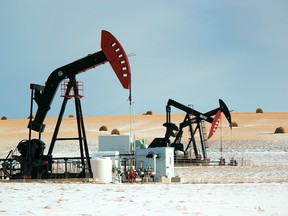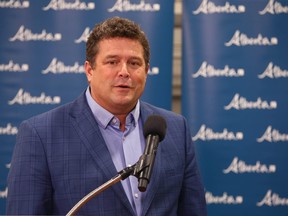
Two Alberta cabinet ministers sent letters over the past week to more than 100 energy companies behind on their property tax bills to municipal governments.
The message was relatively straightforward: Pay up.
“We expect to hear from you within 10 days on steps that your company is taking to resolve these outstanding tax arrears,” the form letter stated.
But what happens when moral suasion or written requests don’t work?
It requires using the government’s clout to get the attention of companies that aren’t making any effort to meet such obligations.
And that’s the latest approach by Alberta to push energy firms to pay their outstanding municipal taxes — a tally that has ballooned by more than 230 per cent over five years
“It’s just not acceptable and there need to be real consequences,” Premier Danielle Smith told leaders at the Rural Municipalities of Alberta (RMA) spring convention on Wednesday in Edmonton.
“We hope that this is just enough of a stick to pay their taxes, and make sure that municipalities are made whole.”
The provincial government announced the step this week to deal with the persistent problem of oil and gas companies not paying their tax bills to municipalities.

The amount of outstanding taxes stood at $81 million in 2018, according to an RMA survey of its 69 members that was conducted the following year.
At the end of 2022, the accumulated tally stood at more than $268 million.
After several attempts in recent years to address the issue with various tweaks, the new strategy has been adopted.
Energy Minister Peter Guthrie directed the Alberta Energy Regulator (AER) to obtain proof from companies that they’ve settled their property taxes before it approves new well licences or transfers existing ones.
The AER and Alberta Municipal Affairs will develop a list of companies that have unpaid taxes topping the allowable amount.
Energy companies on the list will have to confirm their bills don’t surpass a threshold limit — a number that has yet to be set — or show they have a plan in place to deal with these overdue accounts.
The order directs the regulator to take such action by the end of April.
“This is a pretty noticeable stick that will address a large proportion of the problem,” said Tristan Goodman, president of the Explorers and Producers Association of Canada.
Earlier this week, Smith said the idea is to apply some pressure on companies to pay their liabilities to municipal governments, now that oil and gas prices have recovered.
Municipal Affairs Minister Rebecca Schulz and Guthrie also sent letters to 139 companies that are in arrears on their municipal taxes.
“We’re just encouraging them to either settle those debts or make arrangements to settle those debts,” Guthrie said.
“Some of these companies have gone bankrupt . . . but from all of the companies that are still alive and well, it’s time.”
Despite higher commodity prices and record industry cash flow levels, the problem has been mounting.
The latest RMA survey found 41 per cent of unpaid property taxes were tied to operating energy companies.
Seven municipalities have unpaid tax burdens that top $10 million. And since 2015, rural municipalities have written off almost $132 million in unpaid taxes.
RMA president Paul McLauchlin said key details still need to be ironed out, such as what will be the threshold before operators can’t transfer or acquire licences.
However, blocking the transfer of licences should “stop the shuffle game” of some companies moving assets from one firm to another, he said.

Other attempts to push firms to pay haven’t fixed the problem.
For example, in 2021, the AER began to collect information from producers about unpaid landowner lease payments and municipal property taxes — information the regulator would then examine when assessing the financial capability of a company to transfer well licences.
But the head of the AER soon pointed out it wasn’t the regulator’s mandate to collect municipal property taxes or rent owed to landowners.
“Under the UCP, the amount of unpaid municipal taxes from delinquent oil and gas companies grew every year. At first, they did nothing, and then they brought in legislation everyone knew would fail and it did,” NDP MLA Marlin Schmidt said in the legislature Tuesday.
“Now, on the event of an election, they say they’re taking action.”
Crescent Point Energy CEO Craig Bryksa said he supports the changes, as the vast majority of oil and gas producers pay their tax bills. But there are a few companies that “aren’t handling their business the right way and it puts a bit of a black eye on the entire sector.”
He believes the new remedy should work.
“It’ll be a good thing for the industry if the government is going to hold some of these companies that aren’t willing to pay their taxes accountable,” said Bryksa.
It’s not the perfect solution.
Recommended from Editorial
-

Varcoe: ‘A negative development’: Banking turmoil causes oil price slide
-

Varcoe: A spill and unpaid tax bills weaken trust in Alberta oilpatch firms
Companies with unpaid taxes that are winding down operations — or not buying or selling assets — won’t be affected by the new directive to the regulator.
However, it does have some teeth, unlike previous attempts to get tax laggards to move.
“Every other method, ‘That you really should pay, it’s really important, nudge, nudge,’” hasn’t worked, McLauchlin said.
“This is going to work for 80 per cent of the problem, and I’ll deal with the 20 per cent once we get through the 80 per cent. This will be a huge help.”
Chris Varcoe is a Calgary Herald columnist.
You can read more of the news on source

